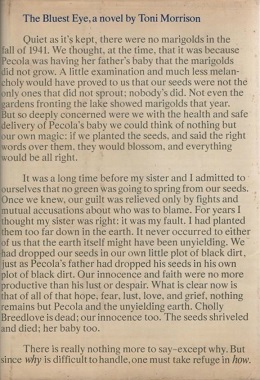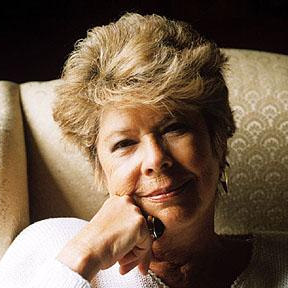Herstory is a term for history written from a feminist perspective and emphasizing the role of women, or told from a woman's point of view. It originated as an alteration of the word "history", as part of a feminist critique of conventional historiography, which in their opinion is traditionally written as "his story", i.e., from the male point of view. The term is a neologism since the word "history"—from the Ancient Greek word ἱστορία, or more directly from its Latin derivate historia, meaning "knowledge obtained by inquiry"— is etymologically unrelated to the possessive pronoun his. In fact, Roman languages originally attribute the word to the female grammatical form, for instance la storia in Italian - a Mediterranean language historically linked closest to Latin.

The Vagina Monologues is an episodic play written in 1996 by Eve Ensler which developed and premiered at HERE Arts Center, Off-Off-Broadway in New York and was followed by an Off-Broadway run in at Westside Theatre. The play explores consensual and nonconsensual sexual experiences, body image, genital mutilation, direct and indirect encounters with reproduction, vaginal care, menstrual periods, prostitution, and several other topics through the eyes of women with various ages, races, sexualities, and other differences.

Katie Roiphe is an American author and journalist. She is best known as the author of the non-fiction book The Morning After: Fear, Sex and Feminism (1994). She is also the author of Last Night in Paradise: Sex and Morals at the Century's End (1997), and the 2007 study of writers and marriage, Uncommon Arrangements. Her 2001 novel Still She Haunts Me is an imagining of the relationship between Charles Dodgson and Alice Liddell, the real-life model for Dodgson's Alice's Adventures in Wonderland. She is also known for allegedly planning to name the creator of the Shitty Media Men list in an article for Harper's magazine.

Third-wave feminism is a feminist movement that began in the early 1990s, prominent in the decades prior to the fourth wave. Grounded in the civil-rights advances of the second wave, Gen X third-wave feminists born in the 1960s and 1970s embraced diversity and individualism in women, and sought to redefine what it meant to be a feminist. The third wave saw the emergence of new feminist currents and theories, such as intersectionality, sex positivity, vegetarian ecofeminism, transfeminism, and postmodern feminism. According to feminist scholar Elizabeth Evans, the "confusion surrounding what constitutes third-wave feminism is in some respects its defining feature."

Rebecca Walker is an American writer, feminist, and activist. Walker has been regarded as one of the prominent voices of Third Wave Feminism, and the coiner of the term "third wave", since publishing a 1992 article on feminism in Ms. magazine called "Becoming the Third Wave", in which she proclaimed: "I am the Third Wave."
First-wave feminism was a period of feminist activity and thought that occurred during the 19th and early 20th century throughout the Western world. It focused on legal issues, primarily on securing women's right to vote. The term is often used synonymously with the kind of feminism espoused by the liberal women's rights movement with roots in the first wave, with organizations such as the International Alliance of Women and its affiliates. This feminist movement still focuses on equality from a mainly legal perspective.

The Bluest Eye, published in 1970, is the first novel written by Toni Morrison. The novel takes place in Lorain, Ohio, and tells the story of a young African-American girl named Pecola who grew up following the Great Depression. Set in 1941, the story is about how she is consistently regarded as "ugly" due to her mannerisms and dark skin. As a result, she develops an inferiority complex, which fuels her desire for the blue eyes she equates with "whiteness".
Islamic feminism is a form of feminism concerned with the role of women in Islam. It aims for the full equality of all Muslims, regardless of gender, in public and private life. Islamic feminists advocate women's rights, gender equality, and social justice grounded in an Islamic framework. Although rooted in Islam, the movement's pioneers have also utilized secular, Western, or otherwise non-Muslim feminist discourses, and have recognized the role of Islamic feminism as part of an integrated global feminist movement.

Marilyn French was an American radical feminist author.

Barbara Smith is an American lesbian feminist and socialist who has played a significant role in Black feminism in the United States. Since the early 1970s, she has been active as a scholar, activist, critic, lecturer, author, and publisher of Black feminist thought. She has also taught at numerous colleges and universities for 25 years. Smith's essays, reviews, articles, short stories and literary criticism have appeared in a range of publications, including The New York Times Book Review, The Black Scholar, Ms., Gay Community News, The Guardian, The Village Voice, Conditions and The Nation. She has a twin sister, Beverly Smith, who is also a lesbian feminist activist and writer.

Fat feminism, often associated with "body-positivity", is a social movement that incorporates feminist themes of equality, social justice, and cultural analysis based on the weight of a woman or a non-binary feminine person. This branch of feminism intersects misogyny and sexism with anti-fat bias. Fat feminists advocate body-positive acceptance for all bodies, regardless of their weight, as well as eliminating biases experienced directly or indirectly by fat people. Fat feminists originated during third-wave feminism and is aligned with the fat acceptance movement. A significant portion of body positivity in the third-wave focused on embracing and reclaiming femininity, such as wearing makeup and high heels, even though the second-wave fought against these things. Contemporary western fat feminism works to dismantle oppressive power structures which disproportionately affect fat, queer, non-white, disabled, and other non-hegemonic bodies. It covers a wide range of topics such as diet culture, fat-phobia, representation in media, ableism, and employment discrimination.
In one scholarly conception, the history of feminism in Poland can be divided into seven periods, beginning with 19th-century first-wave feminism. The first four early periods coincided with the foreign partitions of Poland, which resulted in an eclipse of a sovereign Poland for 123 years.

Lee Marrs is an American cartoonist and animator, and one of the first female underground comix creators. She is best known for her comic book series The Further Fattening Adventures of Pudge, Girl Blimp, which lasted from 1973 to 1977.

Alix Kates Shulman is an American writer of fiction, memoirs, and essays, and a prominent early radical activist of second-wave feminism. She is best known for her bestselling debut adult novel, Memoirs of an Ex-Prom Queen, hailed by the Oxford Companion to Women's Writing as "the first important novel to emerge from the Women's Liberation Movement."
The Feminist Majority Foundation (FMF) is a non-profit organization headquartered in Arlington County, Virginia, whose stated mission is to advance non-violence and women's power, equality, and economic development. The name Feminist Majority comes from a 1986 Newsweek/Gallup public opinion poll in which 56 percent of American women self-identified as feminists. President and one of the founders, Eleanor Smeal, chose the name to reflect the results of the poll, implying that the majority of women are feminists.
Audrey Bilger is the 16th and current president of Reed College. She is former vice president and dean of the college at Pomona College and previously was a professor of literature and faculty director of the Center for Writing and Public Discourse at Claremont McKenna College.
The following is a timeline of the history of feminism.
Feminism in Argentina is a set of movements aimed at defining, establishing, and defending equal political, economic, and social rights and equal opportunities for women in Argentina. Although some women have been considered precursors—among them Juana Manso and Juana Manuela Gorriti—feminism was introduced to the country as a result of the great European immigration wave that took place in the late 19th and early 20th century. The first feminists did not form a unified movement, but included anarchist and socialist activists, who incorporated women's issues into their revolutionary program, and prestigious freethinker women, who initially fought for access to higher education and, later, legal equality with men. The early 20th century was also full of women fighting for their freedom and rights in the workplace. Despite the efforts of the first-wave feminists, Argentine women did not acquire the right to vote until 1947, during Juan Perón's first government. His highly popular wife, Eva, championed women's suffrage and founded and ran the nation's first large-scale female political party, the Female Peronist Party. Although she refused to identify herself as a feminist, Eva Perón is valued for having redefined the role of women in politics.
Feminist businesses are companies established by activists involved in the feminist movement. Examples include feminist bookstores, feminist credit unions, feminist presses, feminist mail-order catalogs, and feminist restaurants. These businesses flourished as part of the second and third-waves of feminism in the 1970s, 1980s, and 1990s. Feminist entrepreneurs established organizations such as the Feminist Economic Alliance to advance their cause. Feminist entrepreneurs sought three primary goals: to disseminate their ideology through their businesses, to create public spaces for women and feminists, and to create jobs for women so that they did not have to depend on men financially. While they still exist today, the number of some feminist businesses, particularly women's bookstores, has declined precipitously since 2000.

Meghan Emily Murphy is a Canadian writer, journalist, and founder of Feminist Current, a feminist website and podcast. Her writing, speeches, and talks have criticized third-wave feminism, male feminists, the sex industry, exploitation of women in mass media, censorship, and gender identity legislation. She is based in Vancouver.









